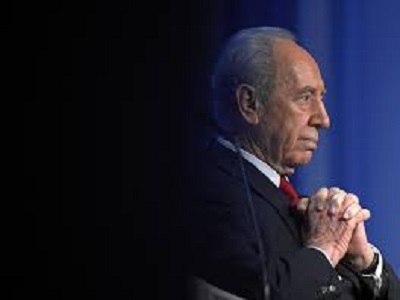
Former Israeli President Shimon Peres has died at a hospital near Tel Aviv at the age of 93, after his condition deteriorated following a stroke, local media report.
Peres was admitted to Sheba Medical Centre in Ramat Gan two weeks ago, where he was intubated and sedated.
On Tuesday, the former top politician suffered a serious setback incurring irreversible brain damage, The Times of Israel reported.
The office of Israeli Prime Minister Benjamin Netanyahu issued a statement of mourning following news of Peres’ death.
“Prime Minister Benjamin Netanyahu and his wife Sara express deep personal sorrow over the passing of the nation’s beloved former president, Shimon Peres,” the statement said.
US President Barack Obama also offered his condolences, saying: “There are few people who we share this world with who change the course of human history, not just through their role in human events, but because they expand our moral imagination and force us to expect more of ourselves. My friend Shimon was one of those people.”
These are the views of several writers on Peres’ death.
Nuclear Man
Jonathan Cook wrote:
Peres – one of the disciples of David Ben-Gurion, Israel’s first prime minister – spent his long political career in the public spotlight, but his greatest successes were engineered in the shadows, noted Yaron Ezrahi, a politics professor at Hebrew University in Jerusalem.
Peres’ most important task, to which he was entrusted by Ben-Gurion, was developing in secret – and over United States opposition – Israel’s nuclear weapons programme through the 1950s and 60s. To that end, he recruited the assistance of France, Britain and Norway.
Peres, like his mentor, believed an Israeli bomb was the key to guaranteeing Israel’s status – both in Washington DC and among the Arab states – as an unassailable Middle East power.
The testing of the first warhead in the late 1960s was probably at least as responsible for ensuring rock-solid US patronage in subsequent decades as Israel’s rapid victory against neighbouring Arab states in the Six-Day War.
Demographic Threat
Ben White wrote:
Peres had a key role in the military regime imposed on Palestinian citizens until 1966, under which authorities carried out mass land theft and displacement.
One such tool was Article 125 which allowed Palestinian land to be declared a closed military zone. Its owners denied access, the land would then be confiscated as “uncultivated”. Peres praised Article 125 as a means to “directly continue the struggle for Jewish settlement and Jewish immigration.”
Another one of Peres’ responsibilities in his capacity as director general of the defence ministry was to “Judaise” the Galilee; that is to say, to pursue policies aimed at reducing the region’s proportion of Palestinian citizens compared to Jewish ones.
In 2005, as Vice Premier in the cabinet of Ariel Sharon, Peres renewed his attack on Palestinian citizens with plans to encourage Jewish Israelis to move to the Galilee. His “development” plan covered 104 communities – 100 of them Jewish.
In secret conversations with US officials that same year, Peres claimed Israel had “lost one million dunams [1,000 square kilometres] of Negev land to the Bedouin”, adding that the “development” of the Negev and Galilee could “relieve what [he] termed a demographic threat.”
False Prophet
Ramzy Baroud wrote:
Shimon Peres is a false prophet, yet he is one of Israel’s most successful political brands. He was promoted as the quintessential ‘dove’ of Israeli politics abroad. But like Ehud Barak, Tzipi Livni and others, he was a ‘peacemaker’ by name only.
Fearing that his reputation as ‘too soft’ to lead Israel – which is often led by battle-hardened generals – would affect his standing among voters, Peres has meted out severe punishment on the Palestinian and Lebanese people for many years. His history was rife with many war crimes that went unpunished.
Although he is remembered for his ordering of the bombing of a UN shelter in the Lebanese village of Qana in 1996 – which killed and wounded hundreds of innocent people – the list of war crimes associated with his name is as long as his career.
Even as a ‘peacemaker’ he failed terribly. He championed the Oslo Accords as a political treaty that would entrench the Israeli occupation and turn the little that remained of historic Palestine into disjointed Bantustans, similar, if not worse than those of South Africa. Yet he never took responsibility, or expressed any remorse for his action.
The Israelis may praise him as a hero, but for Palestinians he is another war criminal who escaped any accountability for his terrible misdeeds.
(PalestineChronicle.com, RT)




